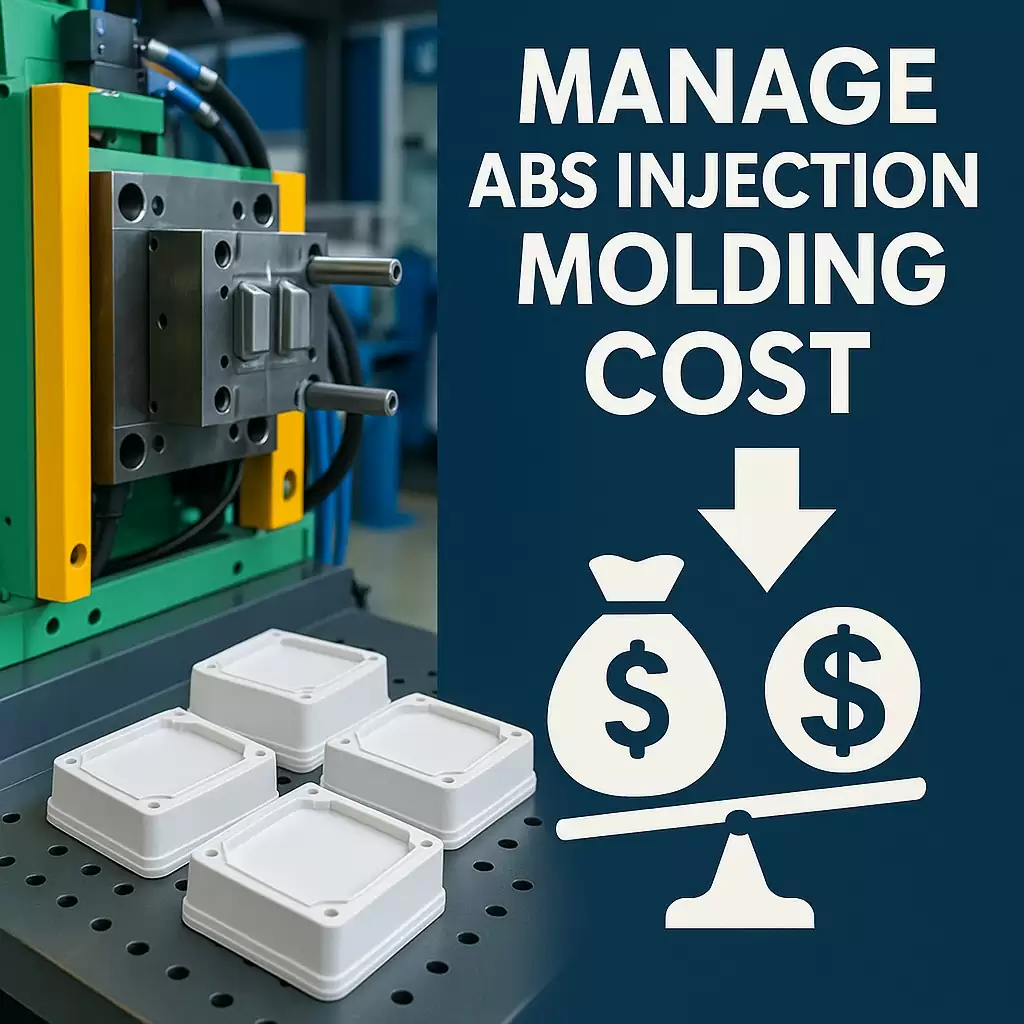Manage ABS Injection-Molding Cost for Low-Risk Product Launches
Manage ABS Injection-Molding Cost for Low-Risk Product Launches
Launching a new product is nerve-racking enough—you don’t need hidden tooling fees, scrap surprises, or capital tied up in slow-moving stock. ABS (acrylonitrile-butadiene-styrene) is a popular choice for pilot programs and first-volume production because it balances toughness, cosmetic quality, and moderate price. The key is structuring your ABS injection-molding plan so every dollar spent is validated by real market feedback. Below is a cost-control playbook—tooling, material, process, and logistics—that lets you hit launch dates and keep risk low.
1 | Start With the Right Tooling Strategy
| Tool Type | Cap-Ex | Lead Time | Shot Life | When to Use |
|---|---|---|---|---|
| Aluminum Tool (Al 7075/6082) | ★★☆☆☆ | 2 – 3 wk | 5 k – 25 k | Proof-of-concept runs, investor samples |
| Hybrid P20 Insert + Al Base | ★★★☆☆ | 3 – 4 wk | 20 k – 80 k | Cosmetic ABS housings, small glass-fill loads |
| Full P20/H13 Steel | ★★★★☆ | 5 – 8 wk | 250 k + | SKU locked, volume confirmed |
Tip – Negotiate a bridge-tool credit so 40 – 60 % of your alu-tool cost is applied to the steel upgrade when demand justifies it.
2 | Material Cost Levers (Without Jeopardizing Quality)
-
High-Flow ABS Grades – Lower clamp tonnage and cut cycle 5 – 10 %.
-
Regrind Policy ≤ 15 % – Internal runners reground into virgin saves 3 – 5 % resin cost; monitor color drift.
-
Talc or Low-Glass Fill (10 %) – Adds stiffness for thin walls; costs only +US $0.05 /kg.
-
Masterbatch Coloring – Concentrate + natural ABS is ~8 % cheaper than pre-colored resin.
3 | Scientific-Molding Tactics to Avoid Scrap
| Parameter | ABS Target | Why It Saves Money |
|---|---|---|
| Melt Temp | 220–240 °C | Overheat = yellow tint, rework |
| Mold Temp | 60–80 °C | Higher gloss, less warp—fewer rejects |
| V/P Switch | 90 % stroke or cavity P = 400 bar | Avoid sink & over-pack |
| Cooling ΔT | ≤ 3 °C across mold | Uniform shrink → CpK ≥ 1.33 first shot |
Implement a quick 10-shot DOE on T-1 to lock these parameters and slash the classic “T-2 / T-3 / polish again” loop.
4 | Cosmetic Finishing Without Bleeding Budget
| Need | Low-Risk Option | Cost Impact |
|---|---|---|
| Piano-black gloss | SPI A-2 polish, UV-cure paint | Moderate; avoid S136 steel by outsourcing hard-coat only if volume ramps |
| Soft-touch feel | TPE over-mold on aluminium pilot | Run insert-mold on same press; no extra adhesive |
| Logo & Icons | Laser etch post-mold | No pad-print clichés; fast revision if branding changes |
5 | Logistics & Inventory—Keep Cash Free
-
Local Molder: Courier parts in 1 – 2 days, cut buffer stock from 6 weeks to 1.
-
Vendor-Managed Inventory (VMI): Pay when parts leave the molder’s dock—ideal for staggered e-commerce drops.
-
Digital OTIF Dashboard: Real-time ship status averts last-minute air-freight premiums.
6 | Example Cost Scenario (ABS Gadget Enclosure, 2 500 pcs)
| Cost Element | Traditional Steel Tool | Low-Risk Plan |
|---|---|---|
| Tool Cap-Ex | US $18 000 | US $5 200 (Alu) |
| Lead Time | 8 wk | 3 wk |
| Part Cost | US $1.75 | US $1.95 |
| Warranty Risk (scrap) | 3.4 % | 0.8 % |
Break-even at ~9 000 pcs; if market takes off, roll credit into steel tool without redesign.
7 | One-Stop Execution via TaiwanMoldMaker.com
-
48 h DFM & Quote Pack – gate, cooling, finish, and cost breakdown.
-
Alu to Steel Credits – prototype cost applied to production tool.
-
On-Site Paint, Laser, Assembly – eliminate second freight leg.
-
Live CpK & OTIF Dashboards – data instead of guesswork.
???? Quick Internal Links
(Bold anchor text maximizes internal-link SEO and click-through.)
Final Word
Managing ABS injection-molding costs for a low-risk product launch isn’t about cutting corners—it’s about smart sequencing of spend: aluminium tools for speed, scientific molding for quality, and data-driven scaling for cost. Ready to launch with confidence? Upload your CAD to TaiwanMoldMaker.com for a no-obligation, 48-hour cost & lead-time plan tailored to your volume forecast.









